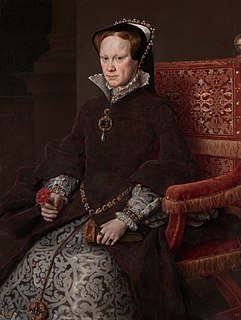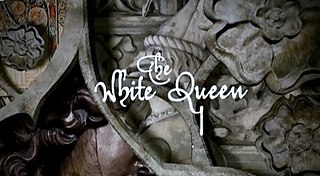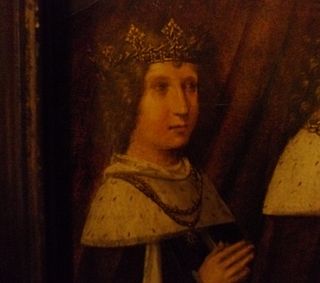
Henry VII was King of England and Lord of Ireland from his seizure of the crown on 22 August 1485 until his death in 1509. He was the first monarch of the House of Tudor.

Mary I, also known as Mary Tudor, and as "Bloody Mary" by her Protestant opponents, was Queen of England and Ireland from July 1553 until her death in 1558. She is best known for her vigorous attempt to reverse the English Reformation, which had begun during the reign of her father, Henry VIII. Her attempt to restore to the Church the property confiscated in the previous two reigns was largely thwarted by Parliament, but during her five-year reign, Mary had over 280 religious dissenters burned at the stake in the Marian persecutions.

The House of Tudor was a royal house of Welsh-French origin that held the English throne, descended from the Tudors of Penmynydd and Catherine of France. Tudor monarchs ruled the Kingdom of England and its realms, including their ancestral Wales and the Lordship of Ireland from 1485 until 1603, with five monarchs in that period: Henry VII, Henry VIII, Edward VI, Mary I and Elizabeth I. There is also a sixth Tudor monarch, Jane Grey, who disputedly reigned for nine days, in between Edward VI and Mary I. The Tudors succeeded the House of Plantagenet as rulers of the Kingdom of England, and were succeeded by the House of Stuart. The first Tudor monarch, Henry VII of England, descended through his mother from a legitimised branch of the English royal House of Lancaster, a cadet house of the Plantagenets. The Tudor family rose to power in the wake of the Wars of the Roses (1455–1487), which left the Tudor-aligned House of Lancaster extinct in the male line.

The Elizabethan era is the epoch in the Tudor period of the history of England during the reign of Queen Elizabeth I (1558–1603). Historians often depict it as the golden age in English history. The symbol of Britannia was first used in 1572, and often thereafter, to mark the Elizabethan age as a renaissance that inspired national pride through classical ideals, international expansion, and naval triumph over Spain.

Elizabeth of York was Queen of England from her marriage to King Henry VII on 18 January 1486 until her death in 1503. Elizabeth married Henry after his victory at the Battle of Bosworth Field, which marked the end of the Wars of the Roses. Together, they had seven children.

Lady Margaret Beaufort was a major figure in the Wars of the Roses of the late fifteenth century, and mother of King Henry VII of England, the first Tudor monarch.
Henry Tudor may refer to:
Tudor most commonly refers to:

The Tudor rose is the traditional floral heraldic emblem of England and takes its name and origins from the House of Tudor, which united the House of Lancaster and the House of York. The Tudor rose consists of five white inner petals, representing the House of York, and five red outer petals to represent the House of Lancaster.

The Tudor period occurred between 1485 and 1603 in England and Wales and includes the Elizabethan period during the reign of Elizabeth I until 1603. The Tudor period coincides with the dynasty of the House of Tudor in England that began with the reign of Henry VII. Historian John Guy (1988) argued that "England was economically healthier, more expansive, and more optimistic under the Tudors" than at any time since the Roman occupation.

In common parlance, the wives of Henry VIII were the six queens consort wedded to Henry between 1509 and his death in 1547. In legal terms, King Henry VIII of England had only three wives, because three of his marriages were annulled by the Church of England. However, he was never granted an annulment by the Pope, as he desired, for Catherine of Aragon, his first wife. Annulments declare that a true marriage never took place, unlike a divorce, in which a married couple end their union. Along with his six wives, Henry took several mistresses.
Michael Hirst is an English screenwriter and producer. He is best known for his films Elizabeth (1998) and Elizabeth: The Golden Age (2007), as well as the Emmy Award-winning television series The Tudors and Vikings. Hirst owns Green Pavilion Entertainment, a production company he launched in December 2017.
Alison Weir is a British author and public historian. She primarily writes about the history of English royal women and families, in the form of biographies that explore their historical setting. She has also written numerous works of historical fiction.

Elizabeth Tudor, is an Azerbaijani-Russian science fiction writer and lawyer of Jewish ancestry.
Elizabeth Gray or Grey may refer to:
Katherine Tudor may refer to:
Elizabeth of England (1533–1603) was queen of England from 1558.
Elizabeth Craig may refer to:

The White Queen is a British historical drama television drama serial developed for BBC One. It is based on Philippa Gregory's historical novel series The Cousins' War. The first episode premiered on BBC One on 16 June 2013 in the United Kingdom. It was first broadcast in the United States on Starz on 9 August 2013.

Edmund Tudor, Duke of Somerset was an English prince, and the sixth child of King Henry VII of England and his wife, Elizabeth of York.
This page is based on this
Wikipedia article Text is available under the
CC BY-SA 4.0 license; additional terms may apply.
Images, videos and audio are available under their respective licenses.









